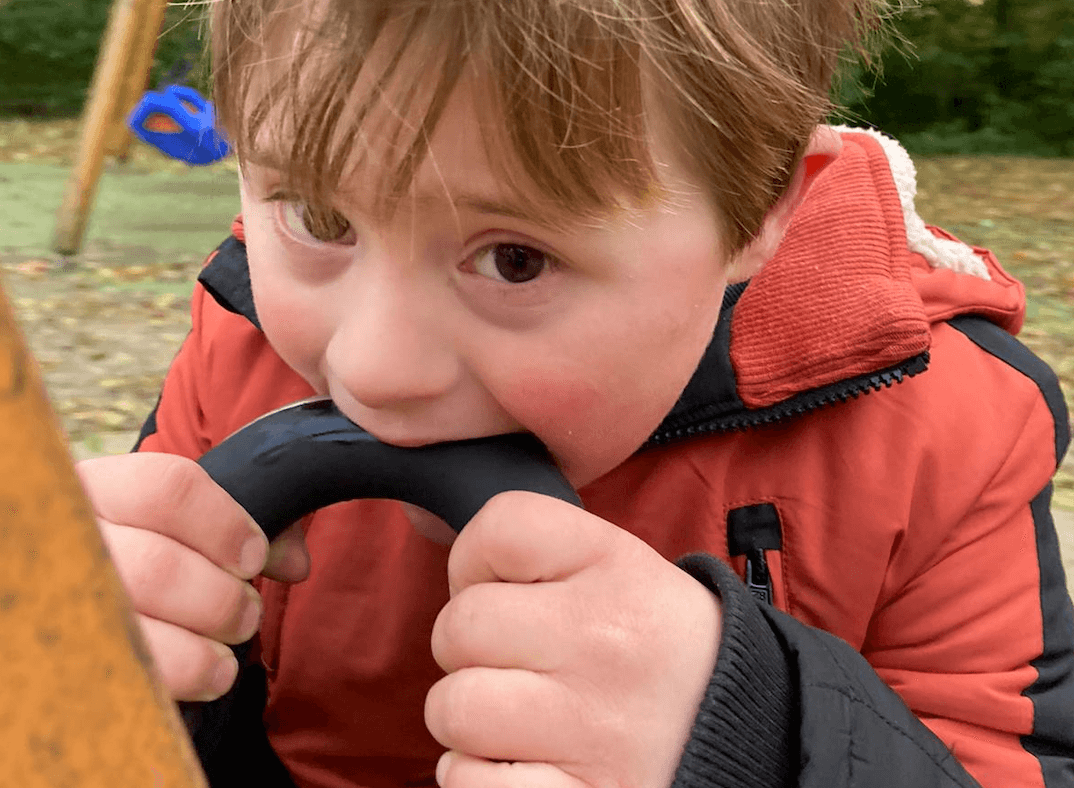Down syndrome and problems with sleeping
Children with Down syndrome have more problems sleeping than other children. Many parents think that these sleep problems are “just a part of it,” so they don`t always mention them in conversations with health professionals. Often the issue is not only the child`s own sleep but also that of the parents and any other family members. In this article you will read more about sleep problems in children with Down and possible solutions for them.
 Some children with Down have trouble falling asleep. A large number of them wake up regularly at night and then have difficulty falling asleep again. The mother of Feike also has this experience. She wrote to us: “Our seven-year-old Feike is an enterprising child with Down syndrome. He is also a sensitive child to stimuli. The impressions he gains during the day keep him from sleeping at night. He wakes up an average of three to six times a night. Moreover, even then he actively seeks out sound stimuli and he thumps against his bed. Also, he goes on walks.” The result? Lots of nighttime wandering, restlessness and broken nights for the whole family.” (Read the whole story from Feike`s mother here.)
Some children with Down have trouble falling asleep. A large number of them wake up regularly at night and then have difficulty falling asleep again. The mother of Feike also has this experience. She wrote to us: “Our seven-year-old Feike is an enterprising child with Down syndrome. He is also a sensitive child to stimuli. The impressions he gains during the day keep him from sleeping at night. He wakes up an average of three to six times a night. Moreover, even then he actively seeks out sound stimuli and he thumps against his bed. Also, he goes on walks.” The result? Lots of nighttime wandering, restlessness and broken nights for the whole family.” (Read the whole story from Feike`s mother here.)
Poor sleep and behavioral problems
Sleeping well is important for every child. At night we rest physically and mentally from what we have done and experienced during the day. This is no different for children with Down. However, a poor night`s sleep can have greater consequences for them because too little sleep can also give rise to other problems. Think of daytime sleepiness, poorer functioning or becoming overly active. Irritability, hyperactivity, aggression, yelling, tantrums and disobedience are twice as common in children with intellectual disabilities as in a group without sleep problems. It is therefore of great importance to identify the sleep problems of your child and to find solutions where possible so that your child sleeps better and longer.
Prolonged crying
Some children with Down syndrome cry for long periods of time at night, interfering with sleep for the whole family. The noise and the constant getting out of bed can keep everyone from sleeping. Families with an intellectually disabled child often experience a significant amount of nighttime stress as a result. Waking up early is another common occurrence in this group of children. As a parent, you also miss out on some of your sleep because of this.
What you might try in such a case is whether your child feels safer and more comfortable in a protected environment, such as in a CloudCuddle bed tent. The confined space, the ability to still see the rest of the room through the mesh and the soft materials bring peace to many children, we often hear back from parents. Read their experiences here.
Down and vacation
You may also want to take a weekend off or a vacation with the whole family. Simply, to a vacation home or hotel of your own choice. But how do you do that if your child has trouble falling asleep and often gets out of bed at night? It`s nice if you can quickly and easily create a safe sleeping environment for your child at the vacation destination. With the CloudCuddle mobile bed tent for example. Did you know that you can easily take a CloudCuddle with you wherever you go? That it does not weigh much and fits around virtually every single bed?
Discuss and try out
If you notice that your child does not sleep enough and is irritable during the day, it is wise to discuss this with a doctor or other practitioner such as an occupational therapist. Often more is possible than you think. For this reason we would also like to invite you to try out a bed tent from CloudCuddle. Who knows, it might bring your child and the rest of the family the extra peace of mind you need. You can request a trial weekend – without further obligations – or rent the CloudCuddle for a while. Try out the bed tent at home or take the CloudCuddle with you during a sleepover or weekend away.
Contact CloudCuddle if you have any questions.
